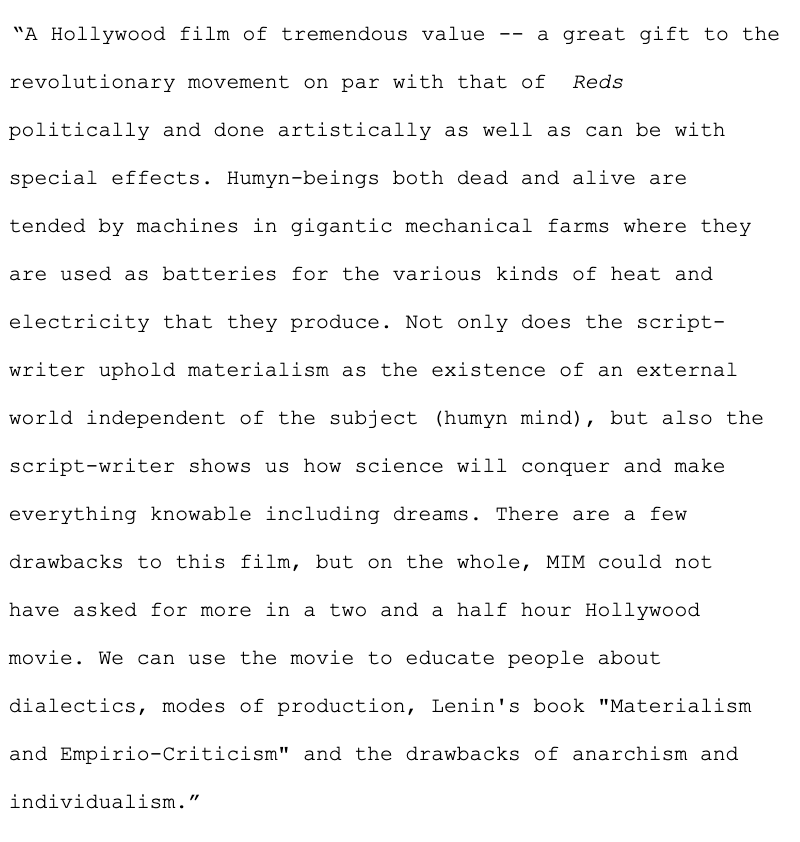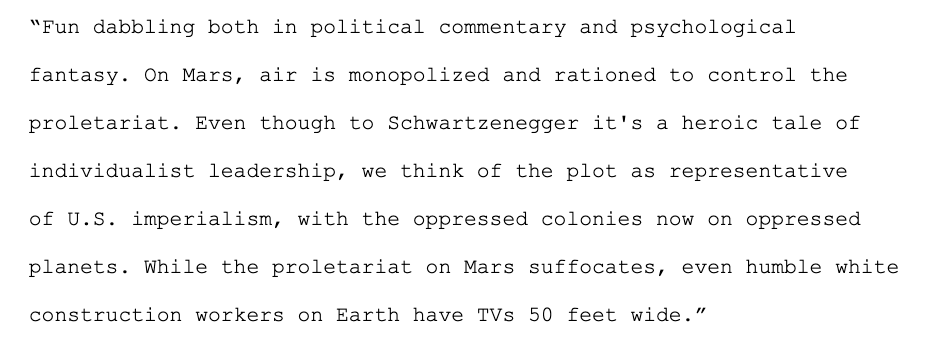MIM Thoughts on Film: Maoist Movie Reviews
Adam Tedesco
My first published writing was Marxist cultural criticism, movie reviews specifically. I used to include this in my bio, but at a certain point it seemed silly to do so. What I’m sharing here is a place in the internet backwaters where my ideas and the ideas of many of my comrades in the Maoist Internationalist Movement (MIM) existed for a brief few years. It’s a sort of looking that we can only do digitally now.
The Maoist Internationalist Movement was a clandestine revolutionary political organization that grew out of the new left movement, splintering from the Harvard-based (RADical ACADemicS) group in 1983. They aimed to help bring about the violent overthrow of the US government by supporting oppressed workers outside of imperialist nations. MIM’s belief was that US military over-extension was inevitable, and it was only through their leadership—a true and uncorrupted proletariat—that revolution in the aftermath would be possible. I was introduced to the group through chatroom discussions about political hardcore bands, and soon after found myself engaged in countless hours of online political struggle, or argumentation, every day. Before being invited to contribute cultural criticism, I was asked to prove myself through demonstrating my knowledge of M-L-M, or Marxism, Maoism and Leninism.
While I recognize the political thrust of MIM thought is outside the interests of many of my readers, I believe there is something of value in digging into this critical perspective, especially in contrast to popular contemporary critical modes. Take the capsule review of The Matrix, for example:
During the MIM’s active years they published a biweekly newspaper, MIM Notes, an occasional Spanish-language publication, Notas Rojas, and a theory journal titled MIM Theory. I was also involved with an offshoot group party called the Revolutionary Anti-Imperialist League (RAIL) which published a zine titled A Single Spark. Shortly after the party was disbanded, the site was taken down. Now, thanks to a still surviving independent cell, the MIM Ministry of Prisons, the majority of this writing is once again available, along with new political writing mostly critiquing the prison industrial complex.
MIM’s concern in the example below is the correctness of politics being conveyed and the film’s usefulness for helping to spread MIM thought. Their signature pithy commentary is also present in this review of Total Recall:
In longer movie reviews, such as this one of Blade Runner, we find a similar tone, but one fleshed out and used to examine works in greater granularity, allowing for more detailed discussions of contentious points.
While my politics and my relationship to the tenets of MIM has evolved in the almost twenty years since my affiliation, the thoughts represented in these reviews is much closer to where my heads head than the political leanings of most friends and colleagues. It’s worth noting that all the writing here is anonymous, both to protect the security of those active in the party and to separate personality from aesthetics and political thought. While anonymity proves counterproductive for most within the marketplace of art discourse, I have long seen the prioritization of materialism in MIM’s cultural writing as a method which may best balance the strengths of The New Critical model and the more identity-focused approaches that followed.
*
Adam Tedesco is a founding editor of REALITY BEACH, a journal of new poetics. His video work has been screened at MoMA PS1, among other venues. His poetry, essays, and interviews have appeared or are forthcoming in Fence, jubilat, Posit, Conduit and elsewhere. He is the author of several chapbooks, most recently Misrule (Ursus Americanus, 2019). His first full-length poetry collection, Mary Oliver, was published by Lithic Press in February.


